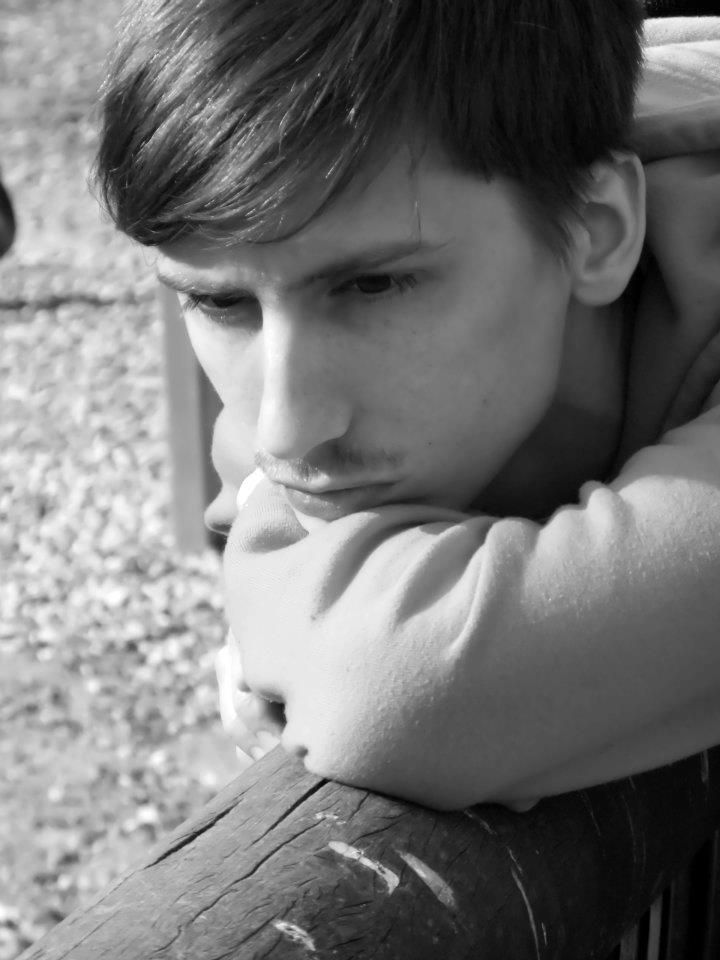Little gas flame sparking in the mulch
Cog-tooth of a Scandinavian iris
Micro-totem to a god of shyness
Petrol bubble birthed from earthy belch
Tree kingfisher chink, shorn off mid-brawl
Driblet-beast from thirty fathoms down
Half-exploded teardrop of a clown
Alien seedling, sown amidst a squall
Blot made by a buggered cartridge pen
Bubblegum in Violet’s champion gob
Goblin bleach got worryingly smart
The genitalia of a very ill man
Lightning caught and boiled down to its nub
An arrowhead that’s softened to a heart
Original appearance at the website of the UK Poetry Society.
Jon Stone profiled by Katy Evans-Bush.
The UK’s Poetry Society, in London runs one of the most prestigious English-language poem competitions. Since 1978 its winners and runners-up have been going on to become active, successful poets, and even a Laureate. This year, some of those poets are touring the internet, telling the stories of their own journeys, each of which started with one poem’s Big Day Out.
Placing in the National: How it Did and Didn’t Change My Life by Jon Stone
When I was younger I used to believe in something called a “break.” This is an event in the life of anyone aiming for a career in the arts (be they the performing arts or otherwise), on the one side of which lies starvation and desperation, the other a snowballing public profile, newspaper interviews, and devoted fans. The break is something to be desired—for without it, one trudges onward feeling unloved and unrecognized—but also feared, since artists are prone to stagnation, particularly when they become disconnected from everyday struggles. The aim is to end up somewhere between Chatterton and Ridley Scott.
At least as far as poetry goes, though, I don’t believe in the break anymore. It’s not just that it hasn’t happened to me and that I’m learning to get along without it; it’s that I’ve now met any number of poets and writers who I’d assumed had broken into what is often called “the big time,” only to find that the drive for greater recognition is still keenly felt. There’s always a bigger mountain to climb.
Stagnation, then, isn’t just the result of idling in a pool of riches and talking to a different Guardian
journalist every week about one’s latest book. It’s to do, I suppose, with any routine or rhythm that one finds oneself unable to break from, even if that routine is struggling on the periphery. It’s also not just to do with your own output, but how people perceive you. There’s a better word than “stagnation,” and that’s “settling.” To settle implies not only to come to rest but to finalize a bargain; in this case, the bargain between yourself and the rest of the world as to your role or function.
Here’s what placing in the National Poetry Competition in 2009 did for me: it shook things up a little. I can’t say I was especially settled, or had settled for my circumstances up until then, but it made me realize how many possibilities I had unconsciously taken off the negotiating table. I had begun assuming, for instance, that I would always be a very difficult sort of writer—too difficult for an organization as clean-cut and public-facing as the Poetry Society. I assumed also that there were certain people I knew—other poets—who would never really rate me. Their tastes and my aims just didn’t quite meet in the middle. That was fine, I supposed. That was the way things were.
One of those poets is now my editor at Salt—the same editor who invited me to submit a manuscript. I’ve also been involved in various aspects of the Poetry Society in the last couple of years: a commissioned article for Poetry News, a poem in Poetry Review, and this August just gone, a set of writing exercises for younger poets. Who knew? And I’m not using these examples to show you that my career has taken off exponentially. It hasn’t. I’m still working a non-literary job, still introducing myself to small audiences at gigs and still deeply flattered (rather than bored) whenever anyone has a kind word to say about my writing. What I’ve found, however, is that things have turned out differently to how I might have imagined. This swerve towards the unexpected is useful; it keeps me from wallowing for too long (in failure or success) and it means I’m still not sure what might happen next. So I keep trying new things, lacking the cynicism to write
them off as hopeless before I’ve even started. This is the most long-standing positive effect of my minor victory, although (I won’t lie) it does help to have it reinforced by subsequent unexpected triumphs. In some sense, it’s the opposite of feeling at ease with oneself, or having come to know oneself. In some senses, it’s discomforting. Well, yes, of course. It’s unsettling. That’s the point.
Jon Stone was born in Derby, and currently lives in London, where he works as a transcript editor (or scopist, as the job is known in the US). He has been commended twice in the National Poetry Competition, in 2009 and 2011, and this year won a Society of Authors Eric Gregory Award. His book, School of Forgery (Salt, 2012) was a Poetry Book Society Summer Recommendation. More info at www.gojonstonego.com.



1 Comment
[…] Bell’s The Bell Jar; Matthew Caley discusses competition tactics at the Writers’ Hub; E-Verse Radio features Jon Stone; Stephen Knight, Julia Copus, Paul Adrian and Samantha Wynne-Rhydderch […]